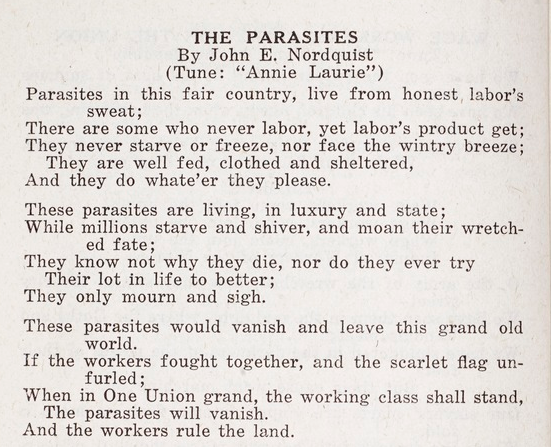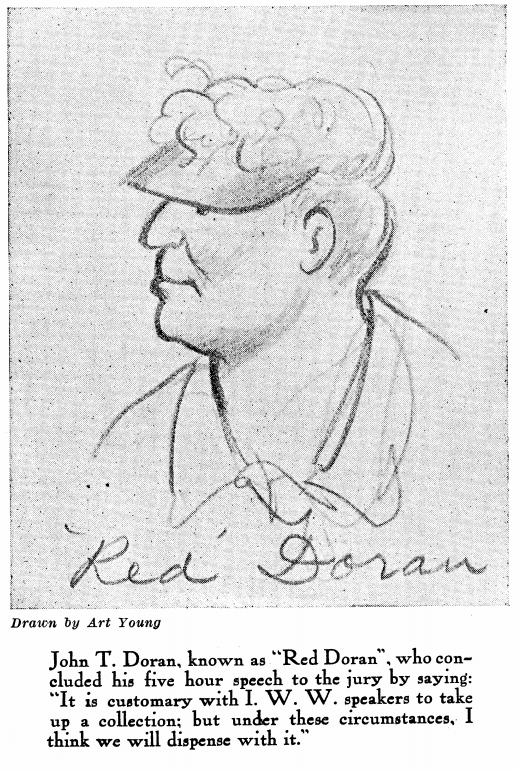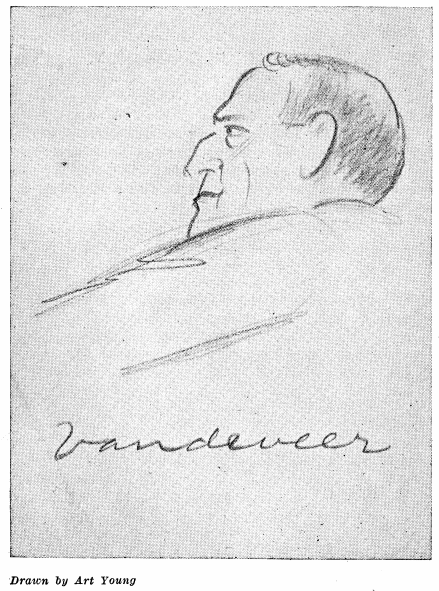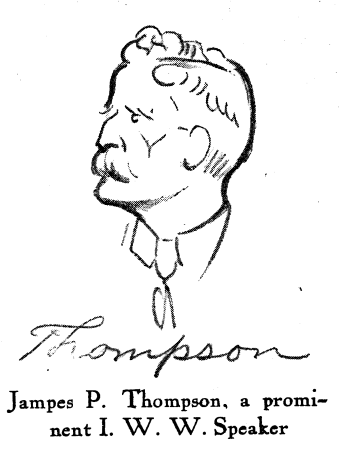Remember, this is the only
American working-class movement which sings.
Tremble then at the I. W. W.,
for a singing movement is not to be beaten.
-Jack Reed
~~~~~~~~~~~~~~~~~~~~~~~~~~~~~~~~~~~~~~~~~~~~~
Hellraisers Journal, Wednesday September 4, 1918
Chicago, Illinois – “”Do you recognize the right of people to revolt?”
From The Liberator of September 1918:
Part III of John Reed’s coverage of Chicago I. W. W. trial with drawings by Art Young-
The Social Revolution In Court
By Art Young And John Reed—–
—–What has all this to do with the trial in Chicago? I plead guilty to wandering from the point. I wanted to give some of the flavor that sweetens the I. W. W. for me. It was my first love among labor organizations; I have had the honor of being arrested in an I. VV. W. strike, and of being in jail with Bill Haywood and other worker-champions for a few days. I shall never forget the impression made on me by a young Italian striker, who read Robert Ingersoll eagerly aloud in the jail; and by Elizabeth Gurley Flynn, then at the height of her rebel beauty; and Carlo Tresca, one of the biggest souls in the world’s labor movement; and Arturo Giovanitti, who writes English poetry to my mind more magnificently than any English-speaking poet….
It was in September, 1917, that the I. W. W. man-hunt began. From that time until April, 1918-seven months-the boys lay in jail, waiting for trial. They were charged with being members of an organization, and conspiring to promote the objects of this organization, which were, briefly, to destroy the wage-system-and not by political action.
All this leading inevitably to the “destruction of government in the United States.”… This main count in the indictment would have been highly ludicrous if it hadn’t been mixed up with the sinister “obstructing the War Program of the Government”; and there were dragged in the twin sins of Sedition and Opposing the Draft….
And while the hundred and twelve were rotting in jail, a ferocious hunt was launched throughout the country; I. W. W. halls were raided, conventions jailed; papers were seized; workers were herded into bull-pens by the thousand; and every organization of police, volunteer or regular, joined the campaign of violence and terrorization against the I. W. W., so widely labelled as German agents….
Of course the “Treason” phase of the case broke down completely. It was only inserted to disguise the real nature of the prosecution, anyway. The blood-curdling revelations of German intrigue promised the world by the prosecution at the opening of the trial did not materialize. The Government experts who examined the books and accounts of the organization admitted that all was in order. Finally, it was not proven that there was an I. W. W. policy concerning the war, or even concerted opposition of opinion to Conscription….
Among other farcical incidents was the loudly-heralded arrival in Chicago of ex-Governor Tom Campbell of Arizona, with a “suit-case full of proofs that the I. W. W. was paid by Germany.” For weeks he stood off and on, waiting to be called to the witness-stand. Then of a sudden he announced in the newspapers that the famous “suit-case” had been stolen by an I.W .W. disguised as a Pullman porter!…
In order that there should be no opportunity for sentimentality, the prosecution dismissed all indictments against women defendants; in order that the I. W. W. should not be able to testify about the worst outrages perpetrated against the workers, not one of the Bisbee deportees was put on trial, and not one of the Butte strikers who might testify to the “Speculator” mine fire…. But because of the latitude allowed by Judge Landis, and the skill of Vandeveer and Cleary, the defense has been one long bloody pageant of industrial wrong; Coeur d’Alene, San Diego, Everett, Yakima Valley, Paterson, Mesaba Range, Bisbee, Tulsa….
From the very beginning, behind shallow legal pretexts loomed the Class Struggle, stark and implacable. The first battle was in the choice of a jury, which dramatically revealed the position of both sides. In examining talesmen, the attorneys for the prosecution asked such questions as these:
“Can you conceive of a system of society in which the workers own and manage industry themselves?”
“Do you believe in the right of individuals to acquire property?”
“You believe, do you not, that all children should be taught respect for other people’s property?”
“You believe, do you not, that the founders of the American Constitution were divinely inspired?”
“Don’t you think that the owner of an industry ought to have more say-so in the management of it than all his employees put together?”
Any prospective juror who admitted a familiarity with Labor history, with economics, or with the evolution of social movements, was peremptorily challenged by the prosecution. The questions of the defense were invariably objected to, and the prosecution made a series of extraordinary speeches to the court, in which were remarks such as the following:
“Karl Marx, father of that vicious doctrine-the cess-pool into which the roots of the I. W. W. have gone for much nourishment.”
“This case is an ordinary criminal case, in which a number of men conspired to break the law…. Their crime consists in the fact that they conspired to take from the employer what is constitutionally his, and in the ownership of which the law supports him.”
“The wage system,” said Mr. Clyne, of the prosecution, “is established by law, and all opposition to it is opposition to law.”
Another time Attorney Nebeker delivered himself of the following: “A man has no right to revolution under the law.” To which Judge Landis himself made remark, “Well, that depends on how many men he can get to go in with him-in other words, whether he can put it over.”
—–The defense sternly held to the Class War issue. Among questions asked the jurymen by Vandeveer and Cleary were:
“You told Mr. Nebeker that you had never read any revolutionary literature. Have you never read, in school, about the American Revolution of 1776? Or the French Revolution which deposed the king and made France a republic? Or the Russian Revolution that overthrew the autocracy and the Tsar?”
“Do you recognize the right of people to revolt?”
“Do you recognize the idea of revolution as one of the principles of the Declaration of Independence?”
“You have told Mr. Nebeker that you don’t think it is right to take away property from those who own it. In our own Civil War, do you think it was right for Congress to pass a law which took away from the people of the South several million dollars’ worth of property in the form of chattel slaves-without compensation?”
“You don’t believe then that property interests are greater than human interests?”
“Suppose these defendants believed that a majority of the people would be right in abolishing modern property rights in the great industries in order to free a great number of working-men from industrial s1avery- would that prejudice you against them?”
“Do you believe workers have the right to strike?”
“Do you believe they have the right to strike even in war times?”
“Which side usually starts violence in a labor dispute?”
Would you be opposed to the application to industry of the underlying principles of American democracy?”
“Do you consider that one individual has an inalienable right to exploit 200 or 300 men and make protected profits off their labor?”
“Don’t you know that 2 per cent of the people of this country control 60 per cent of the nation’s wealth? That two-thirds of the people own less than 5 per cent of the country’s wealth?”
“Do you know that one man had a greater income last year than the combined income of 2,500,000 other Americans?”
“Do you know what effect the wage system has had upon infant mortality?”
“Do you know that prostitution is largely caused by the fact that women in industry do not receive living wages?”
“Do you believe in slavery-whether it be chattel slavery, where the master owned the worker body and soul, or whether it be industrial slavery?”
And so on, for a whole month. What an education that jury had; and what an education the whole country would have had, except that the jackal press has “hushed up” or perverted utterly the story of the I. W. W. trial. Publicity could not help but win the case for the “wobblies”; and so the great prostituted newspapers ignore the most dramatic legal battle since Dred Scott-one whose implications are as serious, and whose sky is banked with thunder-heads….
[Part III of IV, to be continued.]
~~~~~~~~~~~~~~~~~~~~~~
SOURCE & IMAGES
The Liberator
(New York, New York)
https://www.marxists.org/history/usa/culture/pubs/liberator/
-September 1918
John Reed on Chicago IWW Trial
-with Drawings by Art Young, page 20
https://www.marxists.org/history/usa/culture/pubs/liberator/1918/07/v1n07-sep-1918-liberator.pdf
See also:
For more on John Reed and IWW:
John Reed
by Eric Homberger
Manchester University Press, 1990
(search: IWW)
https://books.google.com/books?id=L_HBAAAAIAAJ
The Education of John Reed: Selected Writings
-with bio by John Stuart
(“IWW in Court” on page 175)
International Publishers, 1955
https://books.google.com/books?id=4wFHAAAAYAAJ
John Reed, Witness to Revolution
-by Tamara Hovey
Crown, 1975
https://books.google.com/books?id=AA45AQAACAAJ
For more on the trial:
The Truth about the IWW
Facts in Relation to the Trial at Chicago
National Civil Liberties Bureau, 1918
https://books.google.com/books?id=G1I2AQAAMAAJ
Evidence and cross-examination of J.T. (Red) Doran
in the case of the U.S.A. vs. Wm. D. Haywood et al.
IWW GDC, 1918
https://catalog.hathitrust.org/Record/100663081
Haywood at Chicago IWW Trial
Evidence and cross examination of William D. Haywood
in the case of the U.S.A. vs. Wm. D. Haywood, et al.
Chicago, General Defense Committee, 1918
https://catalog.hathitrust.org/Record/003309919
The I.W.W. Trial
Story of the Greatest Trial in Labor’s History
by one of the Defendants
-by Harrison George
—-with introduction by A. S. Embree.
IWW, Chicago, 1919
https://catalog.hathitrust.org/Record/100663067
~~~~~~~~~~~~~~~~~~~~~~~~~~~~~~~~~~~~~~~~~~~~~
“The Parasites” by John E Nordquist
https://digital.wolfsonian.org/WOLF045327/00001/34j




